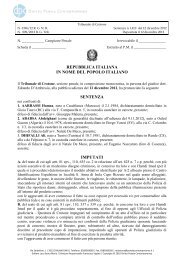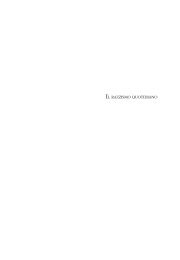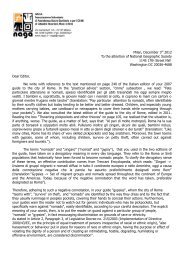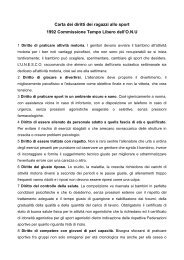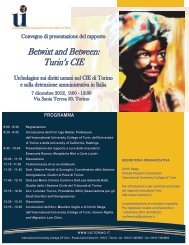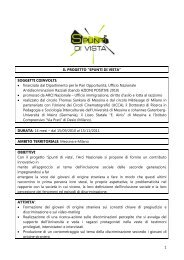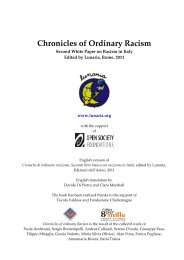Chronicles of ordinary racism 2011 - Cronache di ordinario razzismo
Chronicles of ordinary racism 2011 - Cronache di ordinario razzismo
Chronicles of ordinary racism 2011 - Cronache di ordinario razzismo
- No tags were found...
Create successful ePaper yourself
Turn your PDF publications into a flip-book with our unique Google optimized e-Paper software.
The future <strong>of</strong> citizenship and participation<br />
Filippo Miraglia<br />
In recent years, the topic <strong>of</strong> citizenship has undergone, in public debate, a shift that we<br />
could describe as politically determined, in other words closely linked to the way<br />
politics generally tackles the issue <strong>of</strong> the presence <strong>of</strong> immigrants in our society.<br />
Instead <strong>of</strong> defining a space within which to promote the emancipation <strong>of</strong> in<strong>di</strong>viduals<br />
and progressively extend the civil rights to all, citizenship has gradually come to<br />
identify the demarcation line that defines us by exclu<strong>di</strong>ng others. In other words, we<br />
are used to speaking <strong>of</strong> citizenship as the field that marks the <strong>di</strong>stance between “us”<br />
and “them”. A “them” that, accor<strong>di</strong>ng to the situation, is represented by foreigners,<br />
minorities, above all Roma and Sinti communities, religious minorities, particularly<br />
Muslims and by any other minority that, not included in the definition <strong>of</strong> “citizen”, can<br />
help to better define our identity. This interpretation <strong>of</strong> citizenship finds practical<br />
application in the increasing <strong>di</strong>stance created between people <strong>of</strong> foreign origin and<br />
Italian citizens. A <strong>di</strong>stance that contravenes Art.3 <strong>of</strong> our Constitution inasmuch as it<br />
introduces obstacles to the achievement <strong>of</strong> constitutional equality, rather than<br />
eliminating them.<br />
It is this very principle <strong>of</strong> equality that has progressively worn away over the past two<br />
decades, starting with the public debate on immigration, which undermines the basis <strong>of</strong><br />
our democracy.<br />
Citizenship, more and more frequently interpreted as right <strong>of</strong> blood and “ethnic<br />
belonging”, becomes a source <strong>of</strong> <strong>di</strong>scrimination rather than inclusion in the workplace,<br />
in dealings with public administration, in private relationships and, to an even higher<br />
degree, in legislation. This <strong>di</strong>scrimination finds many vin<strong>di</strong>cations, many supporters<br />
and, consequently, widespread consent: in order to contrast it, therefore, a succesful<br />
strategy and effective and reasonable methods are needed.<br />
We must begin by trying to reverse the long‐established perspectives <strong>of</strong> Italian men and<br />
women on immigration, by promoting initiatives aimed at giving a positive slant to the<br />
public debate. In order to achieve this goal, it is first <strong>of</strong> all necessary to overcome the<br />
constant emergency and instability that plagues the world <strong>of</strong> immigration. Today,<br />
without a stable set <strong>of</strong> regulations, healthy relationships and a civil debate, it will not be<br />
easy to alter the negative public portrayal <strong>of</strong> immigration. For this reason there is a need<br />
for preparatory masures <strong>di</strong>scre<strong>di</strong>ting and <strong>di</strong>smantling clichés and rhetoric platitudes on<br />
immigration. At the same time, it is important to introduce arguments and devices<br />
aimed at constructing a positive image for immigrants, rebuil<strong>di</strong>ng relationships and<br />
links at a grass‐root level and introducing elements that could make structural changes<br />
to public debate, moving the forum in which it takes place.<br />
Today, campaigns and projects to counter <strong>racism</strong> can help to regain the ground taken<br />
up in recent years by assumptions that criminalize immigrants and promote socially<br />
accepted clichés. This is why there is the need for a broad alliance, inclu<strong>di</strong>ng the most<br />
<strong>di</strong>verse elements <strong>of</strong> society, who can boast a certain amount <strong>of</strong> cre<strong>di</strong>bility and a <strong>di</strong>rect<br />
relationship with the general public and middle management in each sector <strong>of</strong> society.<br />
The desired goal is to build or rebuild certain taboos, unbreachable barriers <strong>of</strong><br />
civilization that receive wide consensus. Let us, for instance, consider the reaction<br />
61




